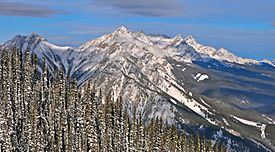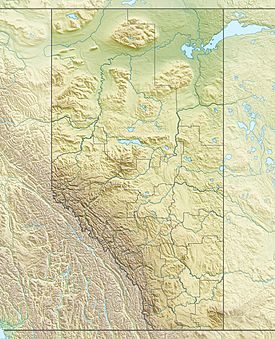Vermilion Range (Alberta) facts for kids
Quick facts for kids Vermilion Range |
|
|---|---|
 |
|
| Highest point | |
| Peak | Cascade Mountain |
| Elevation | 2,998 m (9,836 ft) |
| Dimensions | |
| Area | 142 km2 (55 sq mi) |
| Geography | |
| Country | Canada |
| Range coordinates | 51°22′N 115°43′W / 51.367°N 115.717°W |
| Parent range | Canadian Rockies |
| Topo map | NTS 82O/05 Castle Mountain |
The Vermilion Range is a group of mountains located in Banff National Park, Canada. It is part of the larger Canadian Rockies mountain system. This range sits between other mountain groups. To its west is the Sawback Range, and to its east are the Bare and Palliser Ranges.
The Vermilion Range is home to several important mountains and peaks. The tallest peak in this range is Cascade Mountain.
Major Peaks of the Vermilion Range
Here are some of the main mountains and peaks found in the Vermilion Range:
| Mountain or Peak | Height in Metres | Height in Feet |
|---|---|---|
| Cascade Mountain | 2,998 | 9,836 |
| Flints Peak | 2,950 | 9,682 |
| Mount Brewster | 2,859 | 9,380 |
| Prow Mountain | 2,858 | 9,377 |
| Mount Norquay | 2,522 | 8,275 |
How the Mountains Formed
The mountains in Banff National Park, including the Vermilion Range, are made of sedimentary rock. This type of rock forms from layers of sand, mud, and tiny bits of sea creatures that settle over millions of years. These layers were laid down a very long time ago, from the Precambrian period up to the Jurassic period.
Later, a huge event called the Laramide orogeny happened. This was a time when powerful forces deep within the Earth pushed and folded these rock layers. It caused the older sedimentary rock to be pushed up and over younger rock, forming the tall mountains we see today.
Weather in the Range
The Vermilion Range has a subarctic climate. This means it has very cold winters with lots of snow. The summers are usually mild, not too hot.
During winter, temperatures can often drop below -20 degrees Celsius (which is -4 degrees Fahrenheit). With the wind, it can feel even colder, sometimes below -30 degrees Celsius (which is -22 degrees Fahrenheit).
 | Emma Amos |
 | Edward Mitchell Bannister |
 | Larry D. Alexander |
 | Ernie Barnes |


